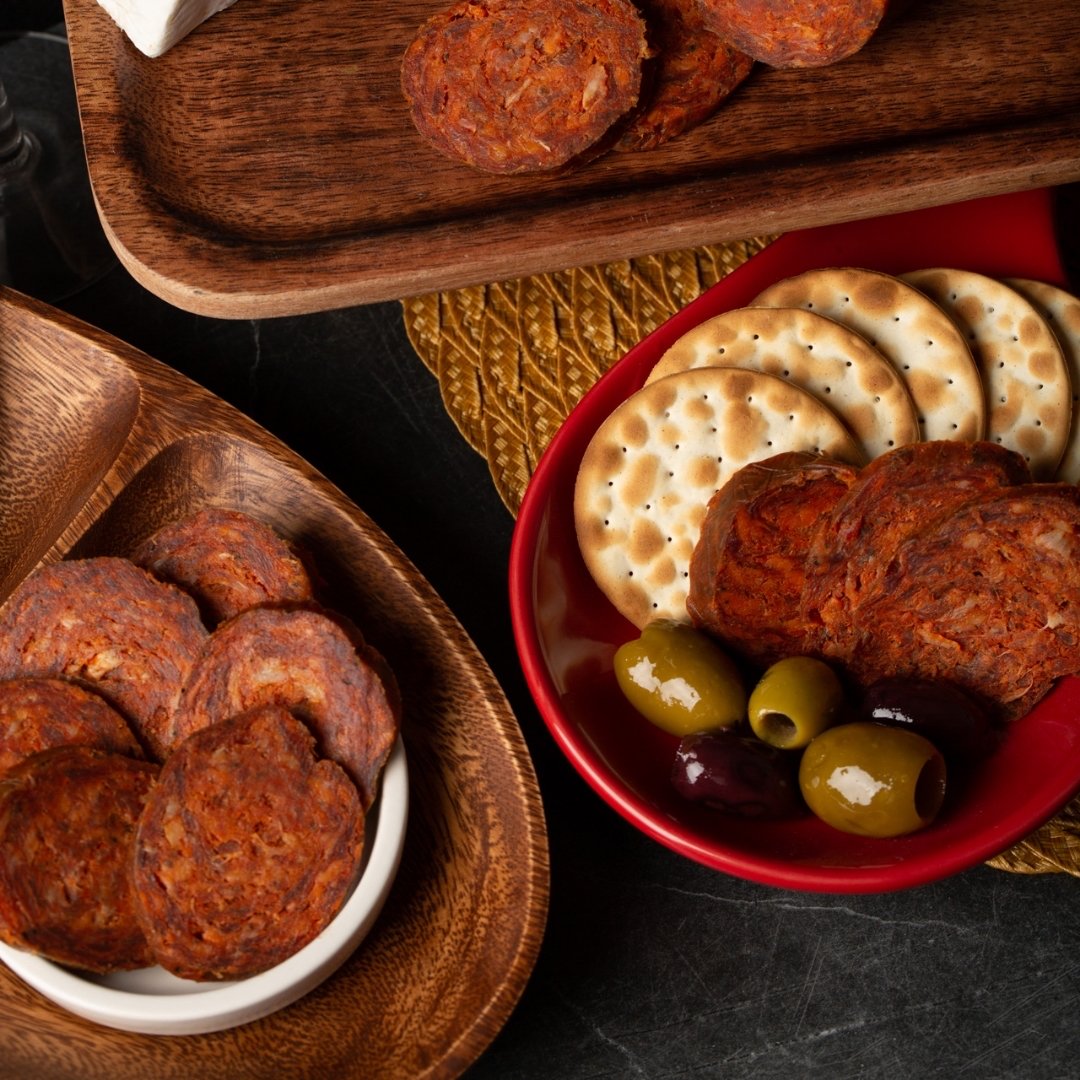How the sausage is made at Three Sisters
by Sharon Fisher
If you live in Idaho, chances are you’ve had chorizo. But you may not have had chorizo from Boise’s Three Sisters Artisanal Meats, runner-up in the Boise Entrepreneur Week Trailmix food startup competition and winning $5,000.
Jaime Fernández, founder of Three Sisters Artisanal Meats. Image courtesy Jaime Fernández.
“We make dry-cured, Spanish-style chorizo,” explained owner Jaime Fernández. “Theirs is fresh. They cook it. Ours, you don’t have to cook it. All you have to do is slice it and eat it. It’s versatile. You can serve it with cheese and olives on a charcuterie board. You could have chorizo and eggs, or an omelet or frittata. You could have a nice chorizo sandwich, put it on pizza, or put it in stews with beans. There’s a lot of things you can do with it.”
How Three Sisters came about
Both sides of Fernández’ family came from the Leon province in the Basque region of northwest Spain – the traditional ancestral birthplace of chorizo, he said. Both sides have been making different kinds of dry-cured meat for generations, starting in northern California.
Fernández used to make the family’s 200-year-old chorizo recipe every winter with his family, and when friends were praising it, and after consultation with his wife, he decided to turn it into a company.
“What we do now is make the only USDA clean label chorizo in the U.S. with a proper Spanish recipe,” Fernández said. The sausage is made with pork and aged 38 days. The spice blend, which is really what makes it chorizo, uses paprika. “It’s got a kick to it,” he acknowledged. “It’s not so hot you can’t enjoy it.”
Clean label means the product has only a few ingredients – shoulder and ham from hogs humanely raised on a vegetarian diet. “We only use like eight ingredients,” Fernández said. “It’s the (author) Michael Pollan mentality – if you can’t read the ingredient, you shouldn’t be eating it.” The spice blend, which is really what makes it chorizo, uses paprika. “It’s got a kick to it,” he acknowledged. “It’s not so hot you can’t enjoy it.”
Fernández didn’t grow up dreaming of a career in food. He was a high school history teacher in northern California for 12 years, but left teaching in 2016 to start the company. First, though, he served an apprenticeship. “For two years, I was working for a meat-packing company in Richmond, California, to learn the butchery industry,” he said. “That means getting up at 4 am, putting on the Carhartt’s, and going into a 34-degree refrigerated warehouse eight hours a day.”
In 2018, Fernández made his first product for sale, a fresh chorizo. On his one day off a week, he’d make his product, package it, label it, put it in a cooler, then drive around the Bay Area hand-delivering the orders, from Richmond to Berkeley to San Francisco to Marin. “That was my Friday afternoon,” he said. On top of that, he hit all the food shows and tastings he could, to get his chorizo in front of people.
Image courtesy Three Sisters Artisanal Meats.
Eventually, the meat-packing company wanted to use the space Fernández was using for his charcuterie. So he and his wife moved to Boise for quality of life reasons, and took the chorizo recipe with them.
Fernández said his family is fine with him taking the family recipe commercial. “I think they were surprised by it, in a good way, but in a ‘what are you doing’ kind of way,” he said. “For my folks, they were a little shocked that this is the direction I wanted to go. But when I broke down how and why, they were starting to understand.”
And who are the Three Sisters? That’s an homage to both sides of Fernández’ family. It refers to his mother and her two sisters, but also to his father, a sheepherder and cowboy in California who worked for the Three Sisters Ranch in the Three Sisters Peak in Colusa County, California, north of Sacramento. “It’s a way to honor both my parents and their background,” he said.
How the company works
Unlike some food companies, Fernández isn’t focusing on making the actual product himself, but works with a Spanish food company out of New York that sources the ingredients, he said. Three Sisters sells the product retail, online, and to grocery stores and food service, he said. Locally, the product has been available at the Boise Basque Market since 2020.
“There are no employees. That’s by design,” Fernández said. “From the outset, I wanted to design the company so the company itself was very lean. We’re not going to own a building or machinery. We wanted to keep this as streamlined as possible to help keep costs down.”
Three Sisters had raised $50,000 from friends and family and is now working with a couple of financial institutions. “Four this round, I had four or five folks I was able to connect with,” Fernández said. “That gave us our first seed money from the outside.” Currently, the company is working with a food broker out of Georgia, with the hopes of getting the product in front of buyers at Kroger, he said. “That’s our goal, to be national,” he said.
In January, Fernández is planning to exhibit at the Specialty Food Association’s Winter Fancy Food Show in Las Vegas, noting that the company is working with the Idaho Department of Agriculture, which discovered Three Sisters through Boise Entrepreneur Week.
“Boise Entrepreneur Week was really good for us that validated a lot of what we’ve been doing,” Fernández said. “We caught the eye of some really good people. We’re in a really good spot. We’ve overcome most of the difficult adversity, we’re getting off the ground and surviving. We’re past that stage and ready to be competitive. We’re very excited for 2023.”
Image courtesy Three Sisters Artisanal Meats.
What’s next?
Right now, Fernández is focusing on the chorizo, but he does have his eye on some expansion possibilities. “There’s a couple of dry-cured artisanal Spanish meats I would like to introduce,” he said. One that’s his favorite is an aged pork loin called lomo. It ages for less than two weeks, compared with his chorizo’s 38 days.
At some point, Fernández would like to add a soy-based vegan chorizo. “There’s a market for it,” he said. “A pretty good section of the population has a different diet. The spice blend is the key. That way, you get everybody.”
But not yet. “For now, the most important thing is getting folks to recognize our brand,” Fernández said. “When they’re familiar and become fans, then that’ll be a good opportunity to add something.”
As far as an exit strategy, “If, ten years from now, I can sell this company to a food conglomerate for a handsome amount of money, I‘d be totally fine with that,” he said. While it’s a family company, that doesn’t mean his sons will take over the business. “I’m building this so eventually I can sell it,” he said. “The whole idea is basically to open the door and let my kids have whatever opportunities they want to pursue.”
Instead, Fernández hopes that his experience with Three Sisters will serve as a model for his sons. “I have no expectation that my boys will take over the company, and I don’t even want them to,” he said. “I want them to forge their own path, the way I did what I wanted to do. I wanted to show them that if you work hard and get your fundamentals right, you can do something unique. I’m first generation and my kids are second generation – I have a responsibility to show them that you can start from nothing and build from it.”
Sharon Fisher is a digital nomad who writes about entrepreneurship.




